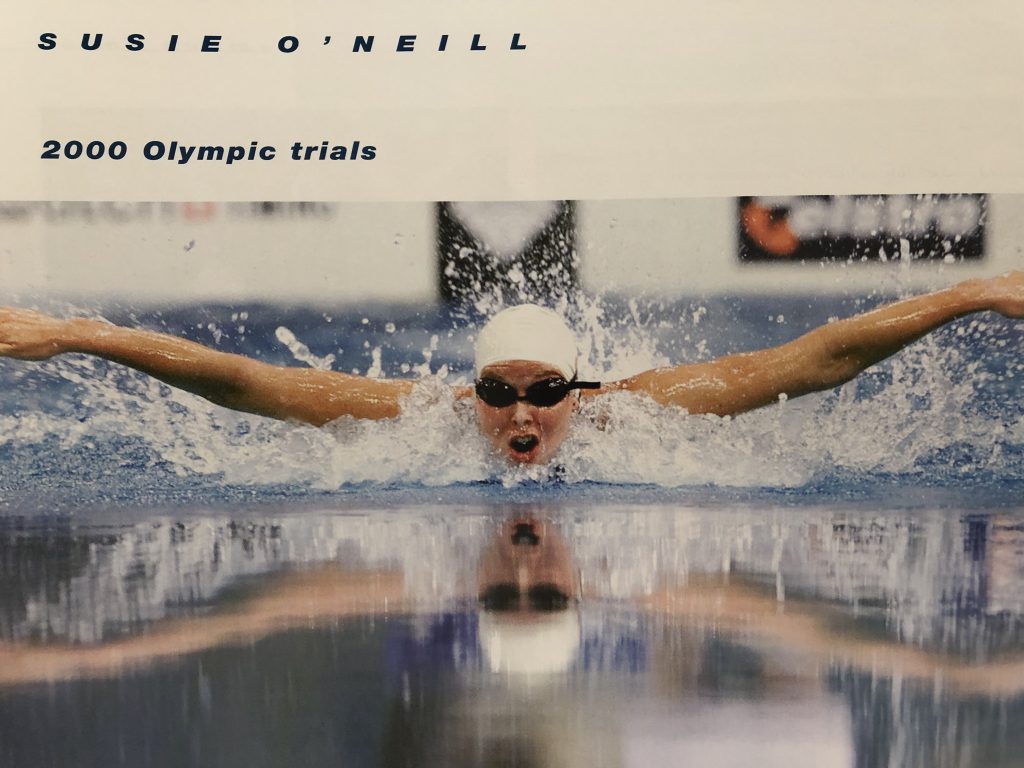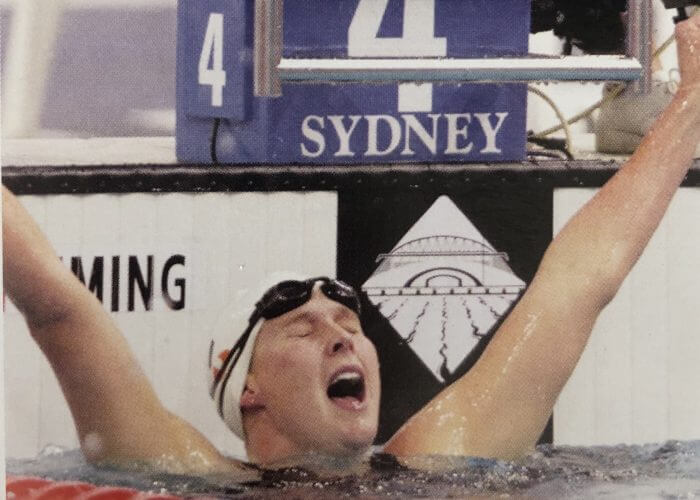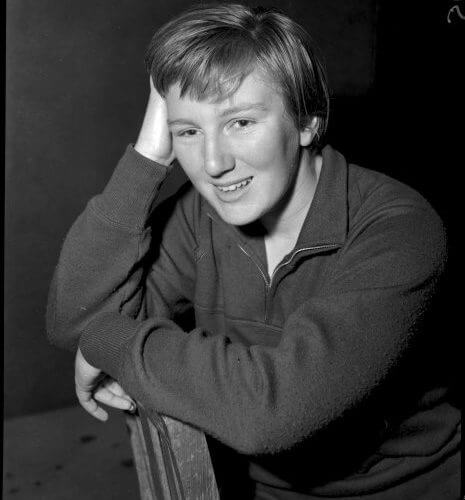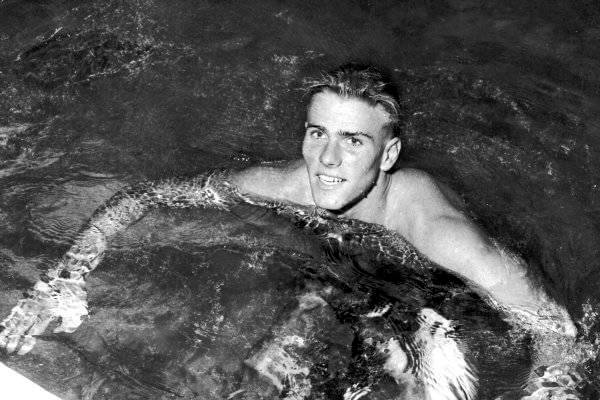Aussie Home Games Heroes Susie O’Neill, Murray Rose And Lorraine Crapp Inducted into Swimming Australia’s Hall Of Fame

Aussie Home Games Heroes Susie O’Neill, Murray Rose And Lorraine Crapp Inducted into Swimming Australia’s Hall Of Fame
Three of Australia’s home Games Olympic heroes Susie O’Neill, Murray Rose and Lorraine Crapp have tonight become the latest members inducted into the exclusive Swimming Australia Hall of Fame.
The gold medal winning trio – O’Neill (Barcelona, Atlanta, and Sydney), Rose and Crapp (Melbourne and Rome), join inaugural 2022 inductees, Freddie Lane, Fanny Durack, Dawn Fraser, Shane Gould and Ian Thorpe.
They were inducted at the Swimming Australia Awards night in Brisbane – host city for the 2032 Olympics.

THE RELIEF: Susier O’Neill breaks Mary T Meagher’s 200m butterfly WR in Sydney. Photo Darin Braybrook (Sport The Library)
Susie O’Neill
After O’Neill had won 200m butterfly bronze at the ‘92 Barcelona Olympics four years before her triumphant Olympic gold in Atlanta in ’96, American Mary T Meagher’s world mark became O’Neill’s the prime target in the lead up to Sydney 2000.
“I remember there being an amazing atmosphere at the Sydney pool that night….and then touching and seeing that I had broken it…it was just like relief, and you know I felt like I was always going to break that record,” O’Neill recalled.
“I woke up thinking this would be my last chance to break it. I didn’t think I’d do it at the Olympics, you know with all the pressure and everything.
“Arriving at the pool and the crowd was just amazing, you just took that for granted back then…and just how many people (12,000) were there and what a big deal it was.
“When I touched the wall, retrospectively I never felt any pain, but you never know whether you feel the pain in the race or not; it usually just depends on the result I’ve found previously…
“With the crowd it was kind of like being a rock star I imagine. Not that I was a rock star but with the crowd we more or less took it for granted given subsequent years.”
But there were mixed emotions for O’Neill when the Sydney Games rolled around – winning gold in the 200m freestyle but relinquishing her ownership of the 200m butterfly to American Misty Hyman the following night – a defeat O’Neill didn’t deal with until the 2010 anniversary of the Sydney Games.
Admitting that she was supposed to win the 200m butterfly and not the 200m freestyle – the event synonymous with her nickname “Madam Butterfly” – adopted from her hero the legendary Mary T Meagher.
O’Neill was a backstroker in her formative age group career in the mid 80s under respected coach Bernie Wakefield at Acacia, the man who set O’Neill up for her spectacular career – before launching her international career in butterfly and freestyle at the ’89 Pan Pacs with Scott Volkers steering her to Games and world record glory.
FOR THE RECORD:
1992 OLYMPIC GAMES: Bronze (200m butterfly); 1996 OLYMPIC GAMES: gold (200m butterfly), silver (4x100m medley relay); bronze (4x200m freestyle relay); 2000 OLYMPIC GAMES: gold (200m freestyle), silver (200m butterfly, 4x200m freestyle relay, 4x100m medley relay); FOUR WORLD RECORDS: 200m butterfly (1-50m, 3-25m); 1993 WORLD CHAMPIONSHIPS (25m): gold (100m butterfly), silver (200m freestyle, 200m butterfly, 4x200m freestyle), bronze (4x100m medley);1994 WORLD CHAMPIONSHIPS: bronze (100m, 200m butterfly); 1995 WORLD CHAMPIONSHIPS (25m): gold (200m butterfly, 4x100m medley), silver (200m freestyle, 100m butterfly), bronze (4x200m freestyle);1998 WORLD CHAMPIONSHIPS: gold (200m butterfly), silver (4x100m medley), bronze (4x100m freestyle, 4x200m freestyle); 1990 COMMONWEALTH GAMES: silver (100m butterfly); 1994 COMMONWEALTH GAMES: gold (200m butterfly, 200m freestyle, 4x200m freestyle); silver (100m butterfly); 1998 COMMONWEALTH GAMES: gold (200m freestyle, 200m butterfly, 400m freestyle, 4x200m freestyle, silver (100m butterfly); 1999 PAN PACIFIC CHAMPIONSHIPS: gold (200m freestyle, 200m butterfly), silver (100m butterfly);
35 NATIONAL CHAMPIONSHIPS.

WORLD BEATER: Lorraine Crapp. Photo Courtesy Lorraine Crapp Private Collection
Lorraine Crapp was the first woman in the world to break five minutes for 400m freestyle and at her home 1956 Olympic Games in Melbourne, she won two golds, a silver, and a bronze medal, adding another silver at Rome in 1960.
With 23 world records, she was regarded as the first great swimmer of the modern era of Australian swimming who burst into prominence in 1954 with her 11-minute 880 yards, and heralded the coming of a new wave of Aussie world record swimmers to dominate the Melbourne Olympics. In 1954 at 15 she won two gold medals at the Vancouver British Commonwealth and Empire Games, adding silver and bronze Empire medals in 1958.
At one time, Lorraine Crapp held all recognized long-course world records in freestyle, from 100m to the half-mile.
Her greatest period of swimming achievement has to be the period just prior to the 1956 Olympics when she broke eighteen world records during training.
In one afternoon, Oct. 20, 1956, Lorraine broke six world records. This was the second time in her career that she set four world records in one race by establishing the zoom, 220 yds., and 400m freestyle records on her way to a world busting 440 yd. record. By the end of 1956, she held world records for 100 yards, 200 meters, 400 meters, 440 yards, 800 meters, and 880 yards.
Her swimming career lasted 10 years, from 1950 to 1960, from her humble beginnings as a schoolgirl on the NSW south coast to her move to Mortlake and Cabarita Swimming Club in Sydney’s inner west and the influence of one of Australia’s greatest coaches in Frank Guthrie – and her own golden career.
Lorraine did it all in a career spanning two Commonwealth Games and two Olympics and in Sydney 2000 she joined fellow swimming greats and fellow inductee the late Murray Rose and Mike Wenden along with the late Bill Roycroft (equestrian), Liane Tooth (hockey), the late Gillian Rolton (equestrian), Marjorie Jackson (athletics) and Nick Green (rowing) to carry the Olympic flag into the Olympic main stadium top the roar of over 100,000 people – 44 years after her home Games debut in Melbourne.
Just one of many fitting rewards for a woman, choosing for so many years to live the quiet life out of the public eye, as she battled a rare genetic disorder Spinocerebellar ataxia (SCA) that can cause poor coordination of hands, speech, and eye movements, just celebrating her 85th birthday on the NSW North Coast.
But despite that, she remains one of the true legends from an era when Australia reigned the lanes – when swimmers and their coaches were ahead of the times and the opposition.
And by 1956 the girl who grew up on the shores of Jervis Bay, had broken no less than 17 world records and by the end of the Olympic year she was not only a two-time Olympic champion but was the world record holder for 110 yards, 200m, 400m and 880 yards – the first Australian swimmer, male or female, to hold world records in all freestyle distances at the same time.
Lorraine actually set her own first ever world record in the 880 yards freestyle on July 2, 1954, on a training camp in Townsville (QLD) as she prepared for the Vancouver Commonwealth Games – at just 15 years of age – smashing a mark that had been held by 1948 Olympic champion over 400 metres freestyle, American Ann Curtis since 1944 – beating the time by some eight seconds.
And then on to the 1956 Olympic Games in Melbourne where Crapp became the Olympic champion in the 400m freestyle in 4:54.6 beating Dawn Fraser 5:02.5 and Sylvia Ruuska (USA) 5:07.1 before combing with Fraser, Faith Leech and Sandra Morgan to win gold in the 4x100m freestyle.
The Aussie girls, Fraser (1:02.0) Crapp (1:02.3) and Leech (1:05.1) had also clean swept the 100m freestyle final – the first time since the USA girls in 1920 and 1924 and the first Aussie gold since the inaugural women’s event won by Fanny Durack with Mina Wylie second in 1912.
“You probably couldn’t have set it up any better could you, the experience of going into the Olympic Games after the Commonwealth Games…a home Games is, any athlete will tell you the same thing and this is why when you get Olympics or the home country always does so well because the athletes are motivated to perform, do well,” Crapp recalled in an interview with this author.
FOR THE RECORD: OLYMPIC GAMES: Melbourne 1956 gold (400m freestyle; 4x100m freestyle relay), silver (100m freestyle);Rome 1960 silver (4x100m freestyle relay); WORLD RECORDS: 23 (110yd, 200m, 400m, 440yd, 800m, 880yd freestyle).

ROSE BOWL: Then great Murray Rose at home in the pool. Photo Courtesy News Ltd.
The late great Murray Rose became the youngest triple gold Olympic medallist in history at the 1956 Games in Melbourne where he won the 400 and 1500m freestyle events and was a member of the winning 4x200m freestyle relay team, at just 17.
Rose made history again in Rome at the 1960 Olympics by becoming the first man ever to win a distance event, the 400m freestyle, in two successive Games – a feat emulated by fellow Australia great Ian Thorpe in 2000 and 2004.
He was a world record holder for nine years in swimming, who at the time was regarded as the world’s greatest swimmer, holding world records over 880 yards, 800m, 440 yards, 400m, 200m, 1500m and 1650 yards.
On the evening of December 7 in 1956, millions of people around the world listened to the 1500m final on their radios. People in Australia watched outside shop windows that had black and white television sets. The sell-out crowd inside the new, Melbourne Olympic Pool cheered itself hoarse as the American swimmer George Breen led Japan’s Tsuyoshi Yamanaka for most of the way…but there…in lane five was the “Seaweed Streak” making waves…400m from home Rose surged and opened up a four-metre lead and went on to win the gold medal.
Rose was everything Australian sport stood for. He was humble, hardworking, with the looks to match…tall, blonde, and handsome. A champion swimmer, a Hollywood movie star and a cover boy in Sydney and California where he went to school at the University of Southern California (USC).
Rose had dominated the headlines, for his amazing ability in the pool and his vegetarian diet – a perfect recipe for stardom.
Australians had witnessed the 17-year-old Rose swim his way into immortality with three gold medals in the 400m, the 1500m and the 4x200m freestyle relay at the 1956 Melbourne Olympics.
A star was born and a boy, who had come to Australia with his parents from England in 1940 was about to transcend anything that had happened in the pool before.
There was a fourth gold medal in the defence of his 400m in Rome four years later again defeating great friend, rival and fellow USC student, Japan’s Yamanaka.
A victory that his 1956 and 1960 teammate, the late John Devitt had regarded as the greatest Olympic victory he had witness until Ian Thorpe’s final relay leg in the 4x100m freestyle in Sydney.
“Sitting in the grandstand in Rome and witnessing Murray’s performance that night was without doubt the greatest individual Olympic victory I have ever seen,” recalled Devitt, who held Rose in the highest regard.
“He and Yamanaka lining up again four years after Melbourne with Rose sitting back comfortably in the first 200 metres, trailing Yamanaka and with one of the finest fields ever assembled pushing hard for a medal.
‘Rose was the master. He knew his opposition. He knew Yamanaka and he waited until he knew it was the right time to strike over the final 100 metres before swimming away with the victory – by exactly the same three second margin that he won the gold four years earlier.”
So much was written about his seaweed and sunflower seed diet, about his amazing mum who travelled the world to ensure Murray was getting the balanced diet that had dominated headlines around the world.
But Murray Rose will be remembered for more than his ability to swim and his extraordinary record-breaking feats…one of eight Olympians chosen by AOC president John Coates to carry the Olympic flag into the Sydney Olympic Stadium during the 2000 Opening Ceremony.
Coates said Rose was an understated perfectionist, a perfect communicator who never seemed to raise his voice. A person whose decency, dignity and generosity of spirit inspired contemporaries and subsequent champions such as Kieren Perkins and Ian Thorpe.
Throughout his career and his life; through his generosity of spirit, his sense of fair play, his modesty, his dignity, his respect for his opposition, his innate sense of decency, his attitude to life. Murray Rose embodied all the values and the virtues that the Olympic movement treasures.”
On April 15, 2012, Australia not only lost one of its greatest swimmers, a man who stood tall for Australia both in and out of the pool but a man who will long be remembered as a role model for all Australians and a fitting inductee into the Swimming Australia Hall of Fame.
FOR THE RECORD: OLYMPIC GAMES:Melbourne 1956: Gold (400m, 1500m freestyle; 4x200m freestyle relay); Rome 1960: Gold (400m freestyle), silver (1500m freestyle), bronze (4x200m freestyle relay); WORLD RECORDS: 200m, 400m, 440yd, 800m, 880yd, 1500m, 1650yd.




For my money, Murray Rose was the swimmer of the 20th century. He was also the most interesting. His diet, his training, his race’s strategy, the way he acted in the pool and out of the pool were fascinating. He is, too, probably the only swimmer who was the subject of two books written by his parents, “Faith love and Seaweed” by his father and “The Torch Within” by his mother!!!